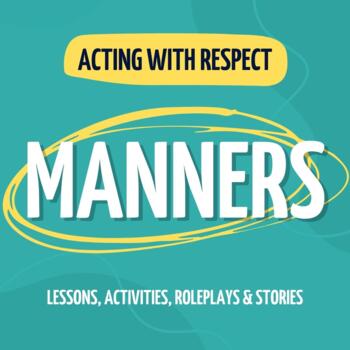Teaching Good Manners: Social & Emotional Lessons & Activities
- Zip
Description
We teach children that “good manners” are important, but we don’t always tell them why. This curriculum helps children and students truly understand why good manners are important and why how they treat themselves and others matters.
Good manners are more than habits we “should” have. For the most part, they allow us to present ourselves in a positive light, and help us demonstrate respect — for other people as well as for ourselves — which is something we need in this world more than ever.
This curriculum builds a foundation of respect for self and others, self awareness, self worth, and important life skills through activities, roleplays, stories, and inquisitive questions. It digs into the why of good manners in a fun, inclusive way that teachers and parents can use to help their children develop healthy habits.
By developing good manners – and learning why they matter – students will be better equipped to interact with others in all aspects of life, both as children and as they grow into adulthood.
*****************************************************************************
What to expect?
Important: This curriculum references martial arts, but the lessons can be used in a regular classroom and references to martial arts can be removed or altered.
Lessons are easy to prepare and can be taught in 15 - 30 minutes per day (or longer). The curriculum includes step-by-step lessons, including questions to ask your students which makes teaching the required information simple. Lessons are easily adaptable to your students and teaching needs.
When learning about manners, it’s important to create a space where students feel comfortable and safe to express themselves. Best taught in small groups of students.
Encourages students to explore questions/situations and learn from "mistakes". As a teacher, encourage all responses because there are no right or wrong answers.
Using the tools and roleplays enhances learning principles in a positive way – allowing students to have fun while they’re learning.
Rather than ask multiple choice questions or ask students to memorize information, this curriculum poses questions that encourage students to think intelligently, on their own.
*****************************************************************************
Lessons
Section 1: Thinking With Respect
- How Do You Like to Be Treated?
- How Do You Like People to Treat You?
- Imagine Being Spoken to With Respect
- Make the Decision to Think Before You Speak
Section 2: Speaking With Respect
- Speak as You Would Like Others to Speak to You
- Ask Questions Politely: “May I please . . .?”
- Offer Information in a Caring, Considerate Way
- Thank People Who Are Helpful to You
Section 3: Acting With Respect
- Act Toward Others as You Would Like Them to Act Toward You
- Offer Assistance When and Where You Can
- Act Today in a Way That Will Make You Proud Tomorrow
- Give People the Greatest Gift — Respect
*****************************************************************************
Topics covered
- Identifying good and bad manners
- Observing how you treat others and how they treat you
- How your actions affect your mind – for good or bad
- Respecting yourself and others
- Why it’s important to treat others with respect
- How acting with respect makes you a winner
- Why are we told to treat people with respect or to have good manners?
- How your words affect others
- Thinking before you speak
- The benefits of offering assistance to others
*****************************************************************************
Want to give your students nonviolent alternatives to fighting?
Check out “12 Ways to Walk Away With Confidence”
Do your students struggle with bullying (as the victim or bully)?
Check out our complete guide to handling bullies.
Teach your students about prejudice
Check out our guide to teaching the roots of prejudice and how to be free of it
Want support with our resources?
Check out https://mapstarstraining.org/course/
*****************************************************************************
Who are we?
The Atrium Society is a non-profit educational organization based in Colorado, USA.
For almost forty years, we’ve worked with teachers, students, and organizations around the world, teaching bullying, prejudice, and peace education. We also work in the martial arts to teach Mental Self-Defense™ (non-violent methods to protect yourself).
To learn more about our founders and directors, Jean and Terrence Webster-Doyle, please visit preventingbullies.com/directors.


